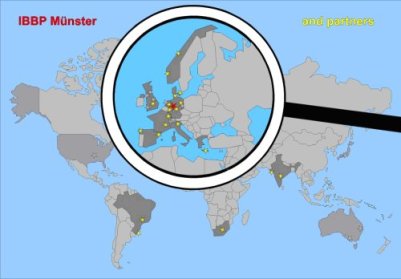We are an international group of ca. 30 BSc- and MSc-students, doctoral and post-doctoral researchers as well as research technicians, with strong international and interdisciplinary links to partners from Academia and Industry, mainly in Europe, but also overseas. Most of the people working in our group are financed by third-party funding, i.e. in research projects supported through EU, BMBF, BMEL, BMWi, MWIDE, and DFG, or by individual fellowships, e.g. through DAAD and DBU, or from abroad.

Our partners in the world.
Students of the University of Münster
If you are interested to join our team, please see Prof. Moerschbacher anytime you meet him in the Institute (always best after prior arrangement of an appointment e.g. via email). BSc students may join us during their third year in the "Projekt-Modul" and for their Bachelor research project ("BSc-Arbeit"). In general, prior successful completion of a "Vertiefungs-Modul" in Biochemistry, Biotechnology, Microbiology, or Molecular Genetics (or equivalent) is a prerequisite for participating in our projects. MSc students may join us during the first year in a "Forschungs-Modul", typically after having successfully completed at least one "Fortgeschrittenen-Modul" in the IBBP. Successful completion of a "Forschungs-Modul" typically is a prerequisite for taking up a Master research project ("MSc-Arbeit") in our group during the second year. Joining our group for a doctoral project typically requires the successful application for a fellowship with one of the national or international funding agencies.
Students from abroad
Should you be interested, after studying our research projects, to become part of our team, you may consider sending an application to us using our Expression of Interest form. Be advised, however, that (except when we specifically advertise positions in an externally funded project) the University of Münster and the Institute for Biology and Biotechnology of Plants do not have the option to offer scholarships so that you will have to apply separately for a research scholarship with one of the appropriate national or international organisations before joining us. Without the successful application for a fellowship from a third party for which you are responsible, you typically cannot be accepted as a doctoral or post-doctoral researcher in our group. Should your experiences and interests meet our expectations, we will of course assist you in preparing a strong research proposal. Admission, however, requires the granting of a fellowship due to a successful application which you have to submit yourself to a third party of your choice. Possible funding agencies may e.g. be found here.
Doctoral studies
To be accepted as a doctoral student at WWU Münster, you need to hold a Master degree or equivalent in one of the life or natural sciences (such as Biology, Chemistry, Biotechnology, etc.) from an internationally recognized university, with above average grades, and typically some research experience, either gained during an extended experimental MSc thesis or in a research project undertaken after MSc studies. Doctoral projects typically last three to three-and-a-half years during which you will be focusing mainly on your project, with few further formal study requirements. You can profit from the offers of the WWU Graduate School of Life Sciences, e.g. by participating in lectures and workshops on topics such as Scientific Writing or Career Development. You will be embedded in a large scientific network, both within and beyond Münster, Germany, and Europe, e.g. by being part of or associated to one of our international and interdisciplinary research projects, and by actively participating in national and international conferences and seminars. The results of our research are generally published in international journals. Obtaining a PhD (Dr. rer. nat.) usually requires the writing of at least three manuscripts, one of which must be accepted for publication at the time of thesis submission. The thesis may be written in German or English. Knowledge of German language is not a formal prerequisite for taking up doctoral studies at the University of Münster, and the weekly Lab Meeting and After Lunch Meetings of our group as well as the Seminar Series of our Institute and Graduate School are all held in English. Acquiring basic skills in German, however, is highly recommended for everyday life in Münster, and for easy socialisation with your colleagues in the lab. The University offers free language classes for foreign doctoral students.
